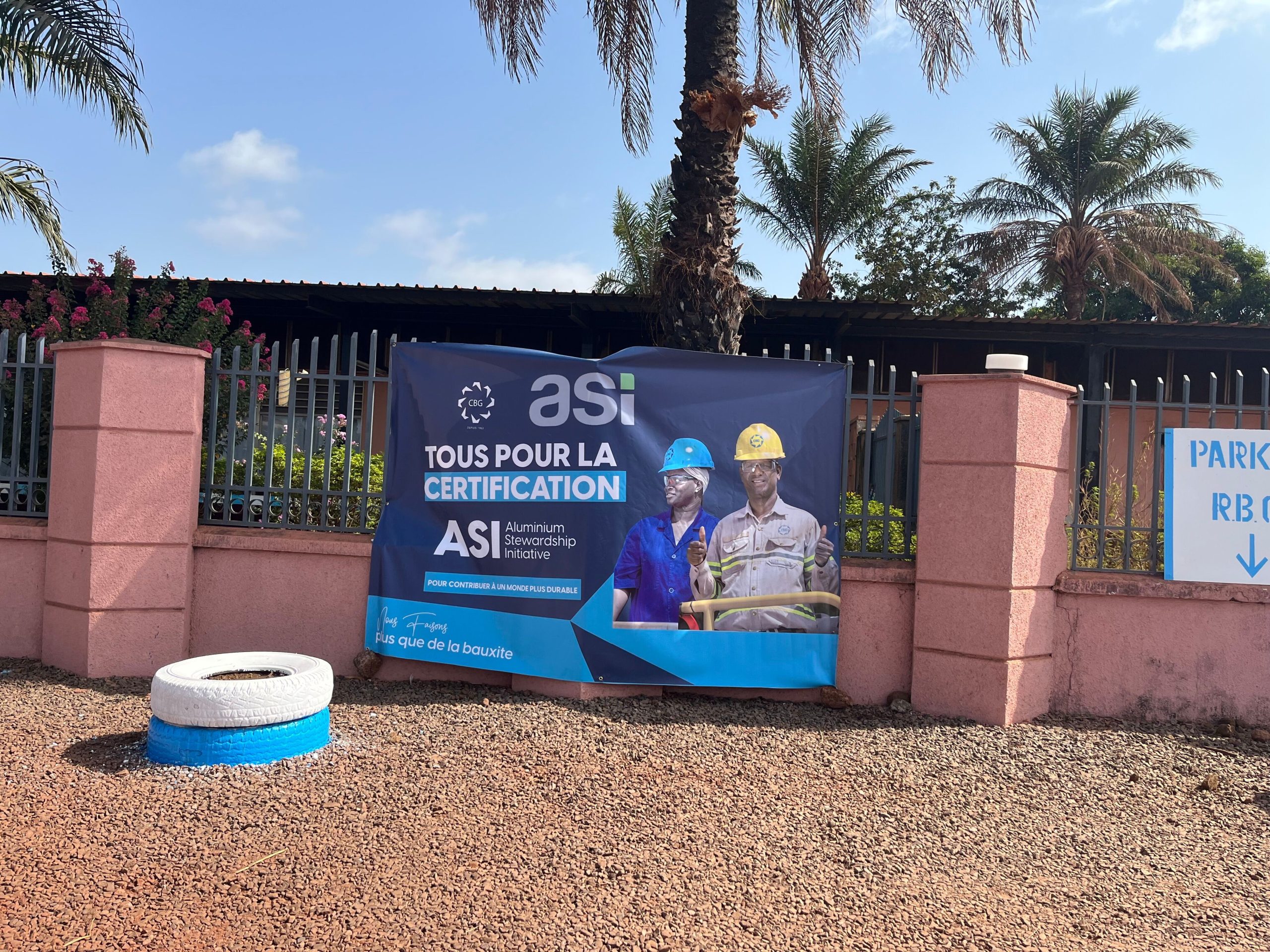Last month, the Aluminum Stewardship Initiative (ASI) granted provisional certification to the Compagnie des Bauxites de Guinée (CBG) mining operation in Sangaredi, Guinea. This certification wrongly suggests that bauxite ore sourced from the CBG mine qualifies as part of a responsible aluminum value chain, despite extensive evidence of the ongoing and unresolved human rights impacts of the mine. Guinean and international non-governmental organizations CECIDE, ADREMGUI and Inclusive Development International, which have been supporting the affected communities to seek redress, have issued a statement outlining how ASI’s audit report downplays or ignores serious harm caused by CBG’s operations. The statement raises questions about ASI’s credibility as a due diligence tool for aluminum end-users, including electric vehicle manufacturers who are under increasing pressure to demonstrate respect for human rights and the environment in their supply chains.
“ASI claims to be promoting responsible sourcing but certifying the CBG mine at this moment in time does the opposite—it’s greenwashing. It sends a signal to the market, including electric vehicle manufacturers, that CBG has made amends for decades of land grabbing. While CBG has taken steps to improve and we hope this progress continues, it has not yet addressed the vast majority of harm it has caused,” said Mohamed Lamine Diaby, Executive Director of ADREMGUI.
“If CBG fully remediates the harm it has caused and ensures that local communities benefit from the mining that’s happening on their land, then we would be the first to applaud them and recommend certification,” said Natalie Bugalski, legal and policy director at Inclusive Development International. “But when ASI gives its stamp of approval prematurely to companies that have not yet met their environmental and human rights responsibilities, it risks disincentivizing continued improvement and undermining affected communities trying to secure remedies for harms they continue to suffer.”
Since it began operations in 1973, CBG—a joint venture between the Guinean government and international mining giants Alcoa, Rio Tinto, and Dadco—has mined large areas of land in the area surrounding the town of Sangaredi, located in Guinea’s Boké region. For years, it has displaced and denied the land rights of local communities, destroyed their agricultural lands and freshwater sources, and damaged critical biodiversity and wildlife, including endangered chimpanzees, creating immense frustration among the local population.
Inclusive Development International, CECIDE and ADREMGUI have for many years worked closely with mining-affected communities in Guinea and elsewhere and currently are serving as advisors to 13 communities engaged in a dispute resolution process with CBG, seeking remedies for human rights abuses committed by the company. The organizations have also provided guidance and support to community representatives in their communications with ASI. As outlined in their response to the certification decision, the organizations have observed serious shortcomings in the initiative’s approach, including its failure to meaningfully inform and engage affected communities as part of the audit process. Neither ASI nor its auditors took proactive steps to ensure that affected communities were informed about ASI and its standards and were prepared to take part in the audit. This was despite numerous requests—from Inclusive Development International and from affected community representatives directly—for more information and for these communities to be given an opportunity to provide input on their own terms.
In their response to the certification, the organizations outline implications of the decision and recommendations for aluminum industry actors and regulators, including:
- ASI should update its standards and process to ensure all audits and certification decisions reflect the concerns of affected communities and realities on the ground.
- Until and unless ASI improves its standards and processes, car companies and other aluminum buyers cannot rely on ASI to effectively evaluate human rights-related risks in their supply chains.
- All companies with supply chain links to the CBG mine should verify any ASI audit findings with other sources, including civil society organizations, and engage directly with communities and other stakeholders as part of their due diligence.
- Policymakers should ensure that emerging mandatory business and human rights regulations, such as those being developed in the European Union, do not treat ASI certification as a proxy for aluminum supply chain due diligence.
“A truly just transition can only be realized if the rights of mining-affected communities are respected,” said Aboubacar Diallo, Executive Director of CECIDE. “Policymakers interested in an effective strategy to curb climate change without wreaking havoc on some of the world’s most vulnerable communities must develop better solutions that compel mining companies to treat these communities with the respect they’re owed.”
Additional Resources
- Joint statement responding to Aluminum Stewardship Initiative’s Certification of Compagnie des Bauxites de Guinée: English; French
- Inclusive Development International’s letter to ASI regarding community engagement in the CBG audit: https://www.inclusivedevelopment.net/wp-content/uploads/2023/07/Letter-to-ASI_IDI_18April2023.pdf
- Inclusive Development International’s comments on ASI’s recent standards revision process: https://www.inclusivedevelopment.net/wp-content/uploads/2022/06/ASICoverLetter02042022Final.pdf
Centre du Commerce International pour le Développement (CECIDE) is a Guinean non-governmental organization founded in 2000 whose mission is to promote and defend the social, economic and cultural rights of communities, and their involvement in the design and implementation of public policies for development.
Association pour le développement rural et l’entraide mutuelle en Guinée (ADREMGUI), is a Guinean non-governmental organization founded in 2006 that works for an institutional, economic and inclusive development at the grassroots level. Learn more at: https://adremgui.org/
Inclusive Development International is a U.S.-based non-profit organization that works to advance social, economic, and environmental justice by supporting communities around the world to defend their human rights and environment in the face of harmful corporate activities. Through our “Follow the Money” research, casework and policy advocacy, we hold corporations and development finance institutions accountable and promote a more just and ecologically sustainable development model. Learn more at: https://www.inclusivedevelopment.net


